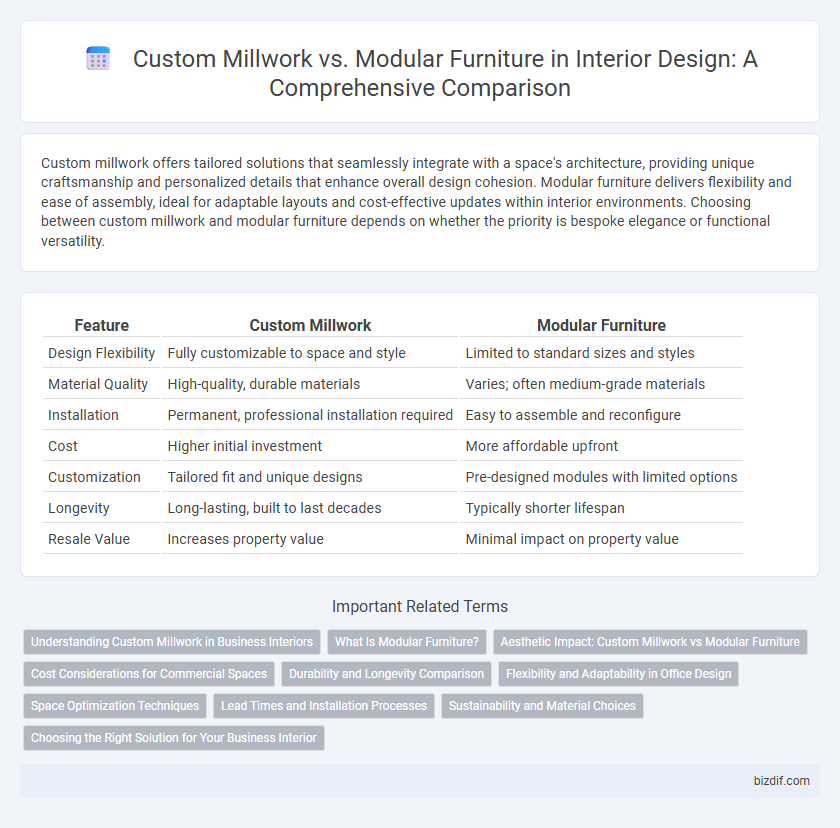Custom millwork offers tailored solutions that seamlessly integrate with a space's architecture, providing unique craftsmanship and personalized details that enhance overall design cohesion. Modular furniture delivers flexibility and ease of assembly, ideal for adaptable layouts and cost-effective updates within interior environments. Choosing between custom millwork and modular furniture depends on whether the priority is bespoke elegance or functional versatility.
Table of Comparison
| Feature | Custom Millwork | Modular Furniture |
|---|---|---|
| Design Flexibility | Fully customizable to space and style | Limited to standard sizes and styles |
| Material Quality | High-quality, durable materials | Varies; often medium-grade materials |
| Installation | Permanent, professional installation required | Easy to assemble and reconfigure |
| Cost | Higher initial investment | More affordable upfront |
| Customization | Tailored fit and unique designs | Pre-designed modules with limited options |
| Longevity | Long-lasting, built to last decades | Typically shorter lifespan |
| Resale Value | Increases property value | Minimal impact on property value |
Understanding Custom Millwork in Business Interiors
Custom millwork in business interiors offers tailored solutions that enhance spatial efficiency and brand identity through precise craftsmanship and high-quality materials. Unlike modular furniture, custom millwork integrates seamlessly with architectural elements, providing unique storage, display, and functional features designed specifically for the business's operational needs. This approach maximizes workspace utilization and durability, contributing significantly to long-term investment value and professional aesthetics.
What Is Modular Furniture?
Modular furniture consists of pre-fabricated, standardized units that can be easily assembled, rearranged, or expanded to fit various interior spaces and functions. It offers flexibility and cost-efficiency, making it ideal for dynamic environments like offices, commercial spaces, and modern homes. Unlike custom millwork, which is tailor-made for specific requirements, modular furniture provides scalable solutions with quicker installation times and simpler maintenance.
Aesthetic Impact: Custom Millwork vs Modular Furniture
Custom millwork offers a unique aesthetic impact by providing tailored designs that seamlessly integrate with the architectural elements of a space, enhancing its overall character and sophistication. Modular furniture delivers versatility and modern appeal through standardized components, allowing for easy reconfiguration while maintaining a cohesive look. The choice between the two hinges on whether the priority is bespoke elegance or flexible functionality within interior design.
Cost Considerations for Commercial Spaces
Custom millwork typically involves higher upfront costs due to bespoke craftsmanship and materials tailored to specific commercial spaces, ensuring a unique and durable finish. Modular furniture offers a more budget-friendly alternative with flexible configurations and quicker installation, ideal for businesses needing adaptability and cost efficiency. Evaluating long-term maintenance, customization needs, and project timelines is crucial in determining the best cost-effective solution for commercial interiors.
Durability and Longevity Comparison
Custom millwork offers superior durability due to its handcrafted construction using high-quality, solid materials tailored to specific design requirements, ensuring a seamless fit and enhanced structural integrity. Modular furniture, while versatile and cost-effective, typically employs mass-produced components that may sacrifice long-term resilience for ease of assembly and flexibility. Longevity in custom millwork is often unmatched, with finishes and joinery designed to withstand wear and environmental factors better than the composite materials commonly used in modular pieces.
Flexibility and Adaptability in Office Design
Custom millwork offers unparalleled flexibility in office design by allowing tailored solutions that maximize space utilization and meet specific functional needs. Modular furniture promotes adaptability through its easy reconfiguration, enabling offices to quickly adjust layouts for changing team sizes or work styles. Both approaches enhance workspace efficiency, but custom millwork excels in permanence while modular furniture delivers dynamic versatility.
Space Optimization Techniques
Custom millwork maximizes space optimization by offering tailored storage solutions that fit specific room dimensions and architectural features, ensuring every inch is utilized efficiently. Modular furniture complements this by providing flexible, reconfigurable pieces that adapt to changing needs and varying layouts, promoting multifunctionality in compact spaces. Combining both approaches enhances spatial efficiency, blending permanence with versatility for optimized interior design.
Lead Times and Installation Processes
Custom millwork typically requires longer lead times due to precise craftsmanship and unique design specifications, often ranging from 6 to 12 weeks. Installation processes for custom millwork are more complex and labor-intensive, necessitating skilled artisans to ensure exact fitting and finish. Modular furniture offers shorter lead times, usually 1 to 3 weeks, and features streamlined installation with pre-fabricated components that reduce onsite assembly and complexity.
Sustainability and Material Choices
Custom millwork offers superior sustainability by utilizing locally sourced, renewable materials and minimizing waste through precise craftsmanship, whereas modular furniture often relies on mass-produced components with synthetic materials that may have a higher environmental impact. Material choices in custom millwork emphasize durable hardwoods and low-VOC finishes that enhance indoor air quality, contrasting with modular options that frequently incorporate particleboard and plastic laminates, which can off-gas harmful chemicals. Prioritizing custom millwork supports eco-friendly practices and longevity, making it a preferred choice for sustainable interior design.
Choosing the Right Solution for Your Business Interior
Custom millwork offers tailored craftsmanship, allowing businesses to create unique, high-quality interior elements that reflect brand identity and maximize space utilization. Modular furniture provides flexibility and cost-efficiency, enabling easy reconfiguration to adapt to evolving workspace needs and streamline installation. Selecting the right solution depends on prioritizing customization and premium aesthetics versus scalability and budget constraints for your business interior.
Custom millwork vs Modular furniture Infographic

 bizdif.com
bizdif.com